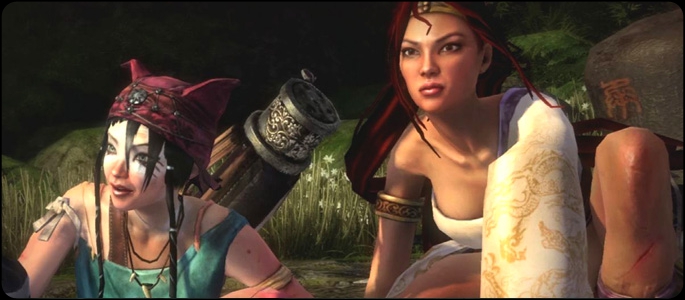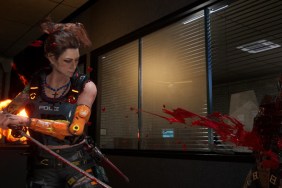Prior to its release, ‘Goddess of War’ was the most common term used to describe Heavenly Sword, and for good reason. The main character, Nariko, wields a sword that splits into dual chain-blades, and the game emphasizes large-scale combat against hordes of enemies. Ninja Theory, the UK-based development team behind this title, hasn’t responded negatively to the moniker, and for good reason. Heavenly Sword was built around a strong narrative, and its combat system really is a sight to behold.
Heavenly Sword, which is named after the legendary sword used in the game, will have you playing as Nariko, a young woman who was thought to fulfill a great prophecy before she was born, but is now an outcast. The sword is a dangerous weapon that grants tremendous power to whomever wields it, but at the cost of that person’s life. Though her people have protected the sword for many years, King Bohan wants the sword for himself and has sworn to kill anyone who stands in his way. Nariko is accompanied by her friend Kai, who follows Nariko on her journey to stop Bohan and save their clansmen from Bohan’s wrath.
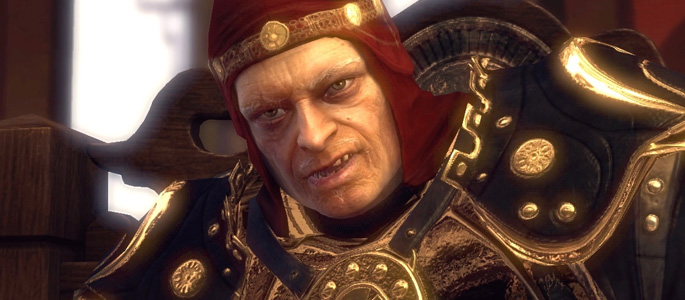
When it comes to the core gameplay, this is a hack-n-slasher through and through. There’s a few twists to the combat system to inject some added depth, but it’s not completely necessary to learn everything within Nariko’s extensive move list, at least not until later in the game. The reason for this is that the game doesn’t require learning the unique combos until enemy difficult ramps up several hours in, allowing those who are new to the genre to quickly become acquainted with the controls.
The heavenly sword can be broken down and used in three separate forms. Each form transfers to a specific attack that Nariko can use. Speed attacks are performed by default, since Nariko is automatically in speed stance. But in order to select her range stance and power stance, the L1 and R1 buttons need to be selected, respectively. Attack combos can be strung together by pressing square and triangle in specific patterns, or by switching from one stance to the next during an attack.
Using combos and different styles are key to defeating enemies quickly, as well as unlocking super moves and bonus content. Each consecutive attack you perform without getting hit fills a meter that’s divided into thirds. Perform enough combos and you’ll earn a new combo; reach the second and third tiers and you’ll unlock making-of movies, artwork, and more. You’ll also gain access to super-style attacks along the way. When you’ve earned enough style points, you can hit the circle button and trigger a short cut scene where Nariko finishes off a foe with creative flair. Again, not a requirement, but it does help out a lot during the more difficult encounters.
Now here’s where the twist come in. The first thing you’ll notice is that there is no block button. Now I know what you’re saying. How can you have a combat system without a block button? Well, as it turns out, Nariko automatically blocks whenever she’s not attacking. There’s also no way to cancel a move and suddenly block an attack. Everything needs to be timed and thought out correctly, and this can be a big challenge as it goes against all conventions within the genre.
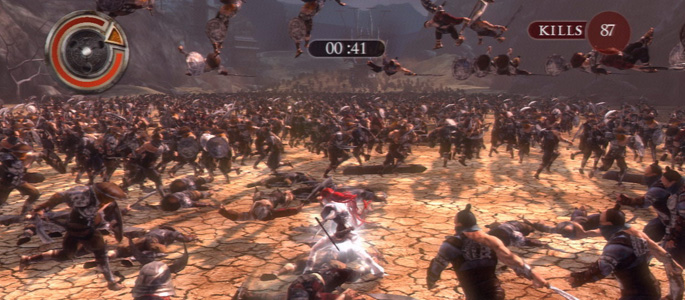
The block system also ties into enemy types and stances. Your enemy will flash a specific color right before they attack you, and that color depends on the type of attack they are about to unleash. Colorless attacks require no player input to successfully block. Range attacks are blue, and Power attacks are yellow, and require selection of the shoulder buttons to successfully block. Unblockable attacks glow red, and as you can guess these are impossible to block. Instead, use the right analog stick to roll Nariko out of the way. Unblockables are the slowest of the bunch, so don’t worry about them too much.
Counter attacks are performed by quickly pressing the triangle as an enemy attack is about to hit you. These are the fastest way to kill an enemy, and also the most difficult. The timing is very tight, but very satisfying, especially during crowded battles. If you screw up the timing on a block or a counter, Nariko will go flying in the air. But if you shake the controller (or press X) while in mid-air, Nariko will toss chain blades at that same enemy and attack them. This is just one of the many attacks you’ll discover as you progress through the game.
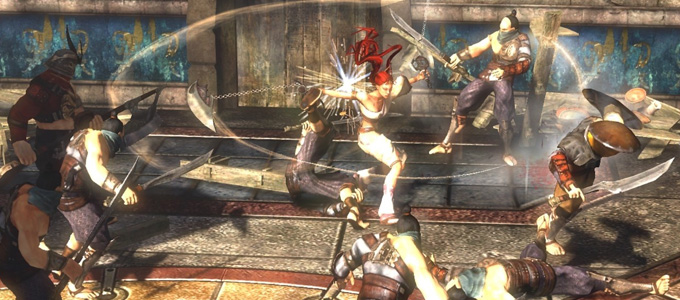
Along with all the hacking and slashing you will encounter some areas where you will require the use of a cannon, a handheld weapon, or a crossbow. The aftertouch system, which slows down time, is used to control these weapons/objects from a first-person perspective. It’s a unique take on bullet time that requires use of the Sixaxis to aim, and does provide much needed relief from the heavy combat segments. Nariko’s friend, Kai, is integral to this system as she carries one of the coolest crossbows ever seen. In fact, it’s almost bigger than her.
Kai is an integral character, and an amazing character study on how psychological damage can both help and hurt individuals. In fact, every character within this story is both believable and unforgettable. The bosses all have over-the-top personalities, and the story is filled with action and suspense (with the occasional bits of humor). Andy Serkis did a stand up job directing the motion-captured performances, and the game stands far above other titles within its genre because of it.
What helps out the believability of these characters, as well as the fantastical world they inhabit, are the graphics. Though the shadows are a bit jagged, every other aspect is done very well. Huge vistas, detailed walkways, and an organic layout to each level definitely sells the tangibility of this world. Everything is living and breathing, and the game has definitely come a long ways from the GDC previews. The number of enemies onscreen during the final battle is just absolutely ridiculous, and is helped out by the robust physics engine. This is one of the best looking PS3 games of 2007, and a wonderful example of what the PS3 is capable of. But even with all this praise, I still had a few issues with the game.
First off, the quicktime events are annoying. They pop up without any warning whatsoever, and take several tries to pull off successfully (and only because you start memorizing them). Even if you press the right buttons at the right moments, the event will still fall apart and occasionally lead to your death. It also would have been nice to have a block button that could override your moves. Some combos take a long time to complete, and enemies will sometimes complete attacks before you have a chance to finish. The developers should have made stance-blocking optional, but have an added benefit, such as taking in less damage than using the block button, for instance.
It’s an epic game, but comes in a little short at just under 8 hours to complete. The length only becomes noticeable because the story is so streamlined and compelling. There are no sidequests, and no optional characters to deal with. I wish it was longer, but the content that’s there is great. The boss fights are insane, and the graphics immerse you into the action like few others can. Heavenly Sword is a great title that definitely warrants a purchase.
PlayStation LifeStyle’s Final ScoreGameplay style is more a button masher. Great use of SIXAXIS motion control. Shockingly good facial animations in cut scenes. |
 |
